327 Search Results for aac awareness
August 13, 2020
by Carole Zangari -
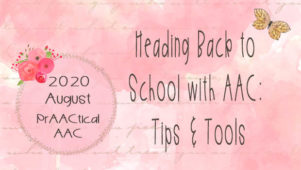
Here in the US, millions of teachers, therapists, families, and students are planning to return to school, whether virtually, in person, or with some combination of the two. No matter what the format for instruction, one of the most important things for students who use AAC is having their SLPs, teachers, and families on the same page. They each have a different but very intense relationship with the student’s AAC system. Today, we reprise a popular post with some prAACtical thoughts on getting everyone pointed in the same direction. 1. Develop a communication profile of the student: In the initial weeks, try to get a baseline of how the student is communicating at the start of the year. For beginning communicators, we track things like their communicative intents (WHY they are communicating), modalities (HOW they are communicating), and the frequency of their communication. We’ve written about one of our favorite... [Read More...]
July 6, 2020
by Carole Zangari -
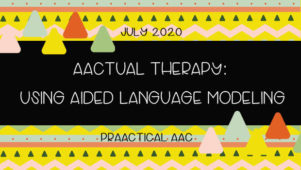
Although we’ve written extensively on the role of modeling in AAC, there are always new perspectives to consider regarding this evidence-based and widely-used strategy. Today, we feature SLPs Kate Grandbois and Amy Wonkka who share their approach to aided language modeling. :::::::::::::::::::::::::::::::::::::::::::::::::::::::::::::::::::::::: Bringing it all Together: Aided Language Modeling Most SLPs working in AAC have come across a variety of different interventions in their practice. Some, like aided language modeling, are popular and commonly seen at conferences. They are the most popular option on the intervention buffet. Others, like discrete trial training, are like the mystery meat – you think you know what it is, you don’t think you’re going to like it, and you’re going to watch while someone else tries it first. Sometimes these teaching procedures are straightforward, and sometimes they are confusing, intimidating, or complicated. You may find that choosing which intervention to use is influenced by... [Read More...]
June 15, 2020
by Carole Zangari -
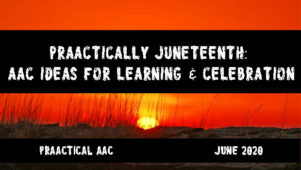
In the US, June 19th is a day that commemorates the ending of slavery. Although the Emancipation Proclamation became effective on January 1, 1863, it took an additional two and half years for it to take root in all of the states. It wasn’t until June 19th, 1865 that Texas became the final state to uphold the proclamation. There are other days that memorialize the freedom of enslaved people, but Juneteenth is the oldest nationally-celebrated commemoration. Traditionally marked primarily by African Americans, there is a growing awareness of Juneteenth across a broad spectrum of people. In modern times, it has become a day to gather, reflect, and celebrate African American freedom and achievement. In these troubled times, it offers us an opportunity to learn about the history and lived experiences of black Americans, examine our own commitment to build a just society, and challenge ourselves to dismantle racism at all... [Read More...]
June 14, 2020
by Carole Zangari -
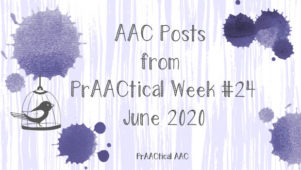
Happy Sunday, AAC friends. It’s been a long week and we’re glad you’re here. Monday – TELL ME About It: AAC Learning with ‘If You’re Angry & You Know It’ Tuesday – AAC Link Up Wednesday – Video of the Week: Social Networks Inventory Thursday – Alternative Learning Experiences in Clinical Education: An AAC Video Case Study If you have a little time before you have to leave, take a few minutes to browse through these past posts. If you’re in a hurry, please skip down to the end. Core Values: Suggestions for Language Building with AAC Learners AAC & Personal Narratives AAC Site of the Month: Centre for AAC AAC: 4 Ways to Develop Self Advocacy Skills & Become A Self Advocate 5 Ways to Support Self-Advocacy in AAC Learners :::::::::::::::::::::::::::::::::::::::::::::::::::::::::::::::::::::::::::::::::::::::::::::::::::::: “Not everything that is faced can be changed, but nothing can be changed until it is faced.” (James... [Read More...]
June 8, 2020
by Carole Zangari -
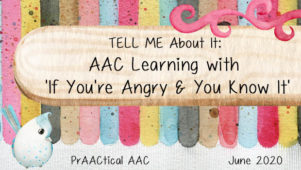
Welcome to a new edition of TELL ME ABout It, a series looking at ways to use children’s trade books to build AAC core vocabulary and literacy skills. Maggie Judson and Jeanna Antrim are back with more great ideas for AAC intervention, this time focusing on the book, ‘If You’re Angry and You Know It.’ Maggie and Jeanna are speech-language pathologists who work in the Assistive Technology Department for the Belleville Area Special Services Cooperative (BASSC) in central Illinois. They are AT/AAC facilitators and provide evaluations, direct therapy, consultations, and trainings. You can see their previous posts in the TELL ME About It series below. The Lunch Box Surprise Come Out and Play, Little Mouse No, David Go Away Big Green Monster What Do You Like? Here Are My Hands From Head to Toe I Went Walking Brown Bear, Brown Bear TELL ME AAC Literacy Kits Don’t miss their videos... [Read More...]
January 20, 2020
by Carole Zangari -
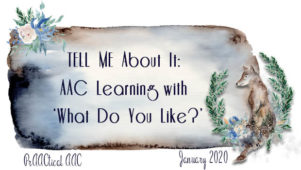
Welcome back to another installment of TELL ME About It, guest authored by Jeanna Antrim and Maggie Judson. Maggie and Jeanna are speech-language pathologists who work in the Assistive Technology Department for the Belleville Area Special Services Cooperative (BASSC) in southern Illinois. They are AT/AAC facilitators and provide evaluations, direct therapy, consultations, and trainings with school teams. In this series, they discuss how they support preschool teachers who are implementing the TELL ME program with their young students. Today, they walk us through the ways that they facilitate AAC use while focusing on the book ‘What Do You Like?’ Don’t miss their Lesson Plan, video demonstrations, and other resources at the end of the post. TELL ME About It: AAC Learning with ‘What Do You Like?’ TELL ME About Reading: The fifth book in the TELL ME program (Teaching Early Language and Literacy through Multimodal Expression) is “What Do You Like?”. ... [Read More...]
December 12, 2019
by Carole Zangari -
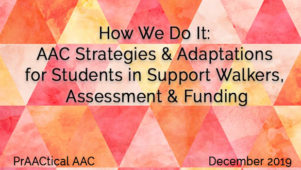
How can we reduce the negative impact of significant motor challenges on children who use AAC and are not independently mobile? Today, we conclude Christine Wright-Ott’s series on this topic. Christine is an Occupational Therapist and consultant at The Bridge School in Hillsborough California. She authored the chapter, Mobility, in several editions of the book, Occupational Therapy for Children. Christine lectures at universities and conferences including ATIA, Closing the Gap, ISAAC, ISS, and AAC by the Bay. If you missed the earlier posts in this series you can catch up via the links below. Part 1: From Wheelchair to Walker: The Cascading Benefit of Hands-Free Mobility Part 2: From Wheelchair to Hands-free Walker for Preschool Children with AAC Needs Part 3: How We Do It: A Support Walker Mobility Program for Elementary Students with AAC Needs ::::::::::::::::::::::::::::::::::::::::::::::::::::::::::::::::::::::::::::::::::::::::::: AAC Strategies, Adaptations for Students in Support Walkers, Assessment & Funding AAC Strategies and... [Read More...]
November 11, 2019
by Carole Zangari -
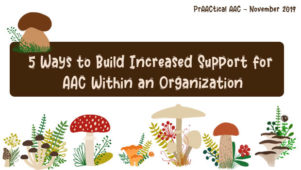
In many organizations, the AAC practices of individual therapists and teachers outpace the support for AAC by the larger staff or community. Here are some suggestions for building more wide-spread support for AAC in schools and other agencies. Take advantage of any requirements to attend mandatory training events. Most school districts have mandatory staff development days, and often, the training provided on those days has little or no relevance to those who do AAC work. Perhaps you can offer a more relevant alternative. Work with administrators to be able to provide AAC training on these days to share information on AAC implementation with teachers, paraprofessionals, and therapists. To get a spot on that calendar, it may take a while to establish rapport and relationships with the leadership team and various department heads but this is time and effort well-spent. Invite administrators, department heads, and committee chairs to AAC-related events on... [Read More...]
November 3, 2019
by Carole Zangari -
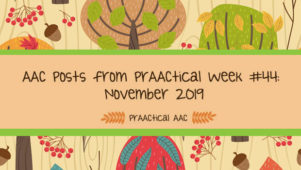
Happy Sunday, AAC friends! Here are some AAC posts that may be of interest. Monday – PrAACtically November: AAC Resources for a Year of Core Vocabulary Tuesday – AAC Link Up Wednesday – Video of the Week: The Life-changing Experience of Getting a Speech Generating Device Thursday – Wrapping Up AAC Awareness Month ::::::::::::::::::::::::::::::::::::::::::::::::::::::::::::::::::::::::::::::::::::::::::::::::::::::::::::::::::::::::::::::::::::: If you have more time, check out these past posts from the archives. 5 AAC Tips for Talking About Halloween After it is Over EET + AAC = OMG Top AAC Videos
October 7, 2019
by Carole Zangari -
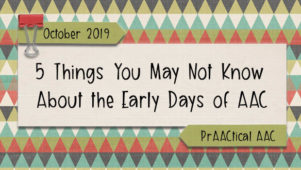
Given that October is AAC Awareness Month we thought that some of you AAC lovers would appreciate a stroll down memory lane. Here are a few things you may not know about the early days of AAC. The first papers that focused on AAC intervention were published in the 1950’s. In 1952, Goldstein and Cameron wrote about their use of communication boards with people with aphasia, and, a few years later, Sklar and Bennett discussed their experiences in using communication charts with this same population. Toward the end of the decade, professionals began describing their efforts in using communication boards with people with physical disabilities (e.g., Feallock,1958; Goldberg & Fenton, 1960). While speech-language pathologists and occupational therapists were among the first to disseminate their AAC work, professionals from many backgrounds contributed to its growth. In the early days, some of the strongest contributors to the field of AAC were rehabilitation... [Read More...]









